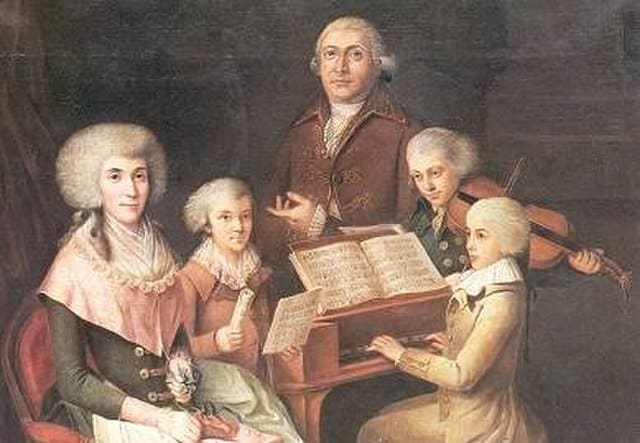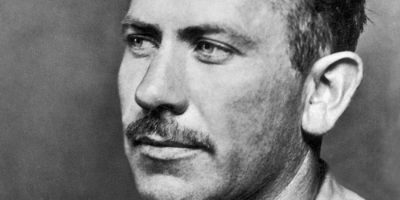30 Famous Music Composers and Their Stories
The art of musical composition has a long, rich history spanning centuries and continents.
From the medieval chants of Hildegard von Bingen to the operas of Verdi in Italy, composers have created iconic works of art. Johann Bach mastered counterpoint, while Beethoven created symphonies even as he went deaf.
Other prodigies like Mozart wrote enduring masterpieces in short lives, while Tchaikovsky battled depression to produce classics like Swan Lake.
Each famous composer, whether romantic virtuosos or 20th-century trailblazers, has a powerful story behind their inspiring creations.
Explore the personal and artistic journeys of these maestros, understanding the cultural and historical contexts that influenced their work.
Here are 30 famous music composers and their stories:
1. Johann Sebastian Bach
Courtesy of YouTube
Johann Sebastian Bach, a German Baroque composer, stands as a luminary in musical history.
Renowned for his intricate compositions and profound mastery of counterpoint, Bach’s legacy endures through a vast body of work.
His compositions span a diverse range, encompassing sublime cantatas, rich orchestral pieces, and profound keyboard music.
A meticulous craftsman, Bach’s genius lay in his ability to weave complex contrapuntal textures, creating timeless and emotionally resonant musical landscapes.
His enduring influence on Western classical music is evident, cementing Bach as an iconic figure whose artistry continues to captivate and inspire generations of musicians and audiences alike.
2. Wolfgang Amadeus Mozart
Wolfgang Amadeus Mozart, an Austrian child prodigy, left an indelible mark on classical music during the 18th century.
Born in 1756, he displayed extraordinary talent from a young age, composing his first symphony at the age of eight. Mozart’s prolific output encompasses over 600 works, showcasing his versatility in opera, symphonies, and chamber music.
Renowned for his innate melodic gift, he brought a fresh, innovative spirit to the classical era.
Mozart’s songs endure through timeless compositions like “Don Giovanni” and “Eine Kleine Nachtmusik,” reflecting his unmatched ability to blend technical prowess with emotional depth, solidifying his status as one of history’s greatest musical prodigies.
3. Ludwig van Beethoven
Courtesy of YouTube
Ludwig van Beethoven, a German composer and pianist bridging the classical and romantic eras, faced adversity with resilience and artistic brilliance.
After losing his hearing in his late 20s, Beethoven defied physical limitations, continuing to compose masterpieces that transcended his struggles.
Renowned for his symphonies, including the iconic Ninth Symphony, he crafted emotionally charged piano sonatas and monumental choral compositions.
Beethoven’s music bore the stamp of innovation, pushing boundaries and redefining classical forms. His deafness fueled a profound introspection, evident in works like the introspective “Moonlight Sonata.”
Beethoven’s enduring impact solidifies him as a titan in the pantheon of classical and romantic music.
4. Pyotr Ilyich Tchaikovsky
Pyotr Ilyich Tchaikovsky, the Russian composer of the late 19th century, achieved immortal acclaim for his enchanting ballets, symphonies, and operas.
Famed for masterpieces like “Swan Lake,” “The Nutcracker,” and the triumphant “1812 Overture,” Tchaikovsky’s compositions embody a seamless fusion of Western and Russian musical traditions.
His works pulsate with emotional depth, resonating universally. Tchaikovsky’s ability to convey both lyricism and grandeur, coupled with his meticulous orchestration, renders his music timeless.
As a trailblazer in Russian classical music, Tchaikovsky’s legacy endures; his compositions weave a rich tapestry that transcends cultural boundaries and captivates audiences worldwide.
5. Frederic Chopin
Courtesy of YouTube
Frederic Chopin was a luminary of the Romantic era and left an indelible mark as a Polish composer and virtuoso pianist born in 1810.
His musical legacy revolves around the piano, where he crafted a treasury of enchanting nocturnes, waltzes, and études.
Chopin’s compositions, notable for their exquisite expressiveness, reveal a profound emotional depth that resonates through each note.
His innovative approach to harmony and his ability to infuse raw emotion into his works set him apart.
Chopin’s influence endured, and his music was immortalized for its ability to evoke powerful sentiments, ensuring his place as a central figure in the pantheon of Romantic composers.
6. Claude Debussy
Claude Debussy, a groundbreaking French composer synonymous with Impressionist music, revolutionized the classical landscape.
Renowned for his visionary harmonies and intricate textures, exemplified in timeless compositions like “Clair de Lune,” Debussy transcended musical conventions.
His work, characterized by evocative tonal colors and subtle nuances, marked a departure from traditional forms.
A trailblazer of the late 19th and early 20th centuries, Debussy’s innovations had a profound impact on the direction of 20th-century music.
His ability to capture fleeting moods and paint vivid musical landscapes cemented his status as a pivotal figure, influencing generations of composers and leaving an enduring imprint on the evolution of classical and modern music.
7. George Frideric Handel
Courtesy of YouTube
George Frideric Handel, a German-born Baroque composer who became a British luminary, profoundly shaped the musical landscape of the 18th century.
Celebrated for his magnum opus, the oratorio “Messiah,” and the captivating Water Music suites, Handel’s compositions bridged the sacred and secular realms. Pioneering the English oratorio style, he elevated choral music to new heights.
His profound understanding of dramatic expression and melodic richness left an indelible mark on Western classical music.
Handel’s legacy endures not only through his enduring masterpieces but also as a pivotal figure whose innovative spirit and prolific output continue to inspire musicians and audiences alike across generations.
8. Franz Schubert
Franz Schubert, the Austrian classical composer of the 19th century, left an enduring legacy through his profound contributions to the Romantic movement.
Renowned for his mastery of lieder and German art songs, Schubert composed over 600 songs that explored the depths of human emotion.
His timeless creations, including the iconic “Ave Maria,” showcased his ability to infuse melodic beauty with poetic expression.
Schubert’s influence on the Romantic era resonates through his innovative harmonic language and introspective compositions.
Despite a tragically short life, his impact on the evolution of classical music endures, solidifying Schubert as a pivotal figure whose artistry continues to captivate and inspire across the centuries.
9. Igor Stravinsky
Courtesy of YouTube
Igor Stravinsky, the Russian composer, conductor, and ballet innovator, reshaped the landscape of 20th-century music.
Renowned for groundbreaking works such as “The Rite of Spring,” Stravinsky’s compositions challenged traditional conventions, introducing rhythmic complexities and dynamic textures.
His collaborations with Sergei Diaghilev’s Ballets Russes, including “The Firebird” and “Petrushka,” showcased a revolutionary fusion of music and dance.
Stravinsky’s penchant for experimentation extended to neoclassical and serialist periods, marking him as a central figure in the evolution of musical innovation.
His enduring influence transcends genres, reflecting a creative spirit that continues to inspire generations of composers and redefine the boundaries of classical and contemporary music.
10. Giuseppe Verdi
Giuseppe Verdi the eminent Italian opera composer, profoundly shaped the world of classical music and was born in 1813.
Renowned for masterpieces like “La Traviata,” “Rigoletto,” and “Aida,” Verdi’s operas epitomized emotional intensity and melodic brilliance.
A towering figure in the development of Italian opera during the 19th century, he navigated themes of love, betrayal, and political intrigue with unparalleled skill.
Verdi’s works not only captured the essence of human drama but also demonstrated his ability to transcend the operatic form, creating enduring melodies that resonate across cultures.
As a key protagonist in the evolution of Italian opera, Verdi’s legacy endures, immortalizing him as a pivotal figure in the realm of classical composition.
11. Antonín Dvořák

AnonymousUnknown author, Public domain, via Wikimedia Commons
Antonín Dvořák the Czech composer, enriched the classical repertoire with his evocative symphonies and chamber music.
Celebrated for his unique voice, Dvořák seamlessly integrated folk elements into his compositions, becoming a prominent figure in the late Romantic era.
His masterwork, the “New World Symphony,” exemplified his ability to blend European tradition with American influences. Dvořák’s melodies resonate with Bohemian folk rhythms, offering a distinctive musical tapestry.
As a professor at the National Conservatory of Music in America, his impact extended beyond his compositions, influencing generations of musicians.
Dvořák’s legacy endures, a testament to his innovative spirit and enduring contributions to the world of classical music.
12. Sergei Rachmaninoff
Sergei Rachmaninoff, the Russian composer and virtuoso pianist, left an indelible mark on the Romantic era with his lush and expressive compositions.
Renowned for his emotive prowess, Rachmaninoff created timeless works that resonate with passion and grandeur.
His Piano Concerto No. 2 and the “Rhapsody on a Theme of Paganini” exemplify his mastery of melody and intricate piano technique.
Despite facing the tumultuous backdrop of early 20th-century Russia, Rachmaninoff’s music transcends its time, captivating audiences with its profound beauty.
His enduring legacy reflects an artistic brilliance that continues to inspire admiration and awe in the world of classical music.
13. Richard Wagner
Courtesy of YouTube
Richard Wagner, the German composer, revolutionized the operatic landscape with his visionary contributions and the concept of Gesamtkunstwerk, or “total artwork.”
His monumental “Ring Cycle,” a four-opera saga, stands as a testament to his artistic ambition and thematic depth.
Wagner’s influence on modern opera is profound, marked by innovations in orchestration, leitmotif usage, and expansive thematic structures.
Despite the controversy surrounding his personal and political beliefs, Wagner’s impact on the evolution of music and drama endures.
His legacy extends beyond the confines of traditional opera, solidifying Wagner as a seminal figure whose artistic vision continues to shape the trajectory of classical and theatrical arts.
14. Johannes Brahms
Johannes Brahms, the German composer and pianist of the Romantic era, left an indelible mark on classical music.
Renowned for his symphonies, chamber music, and choral compositions, Brahms skillfully blended emotional depth with classical form.
Rejecting the more flamboyant trends of his time, he remained steadfast in his dedication to structural clarity and traditional craftsmanship.
Brahms’ meticulous approach and rich harmonic language demonstrated a profound understanding of both classical traditions and the evolving Romantic spirit.
His enduring contributions to the symphonic repertoire and commitment to classical principles have solidified Brahms as a central figure in the history of Western classical music.
15. Aaron Copland
Courtesy of YouTube
Aaron Copland, the American composer, played a pivotal role in shaping the identity of American classical music.
Renowned for infusing his compositions with American folk influences, Copland created enduring works like “Appalachian Spring” and the stirring “Fanfare for the Common Man.”
His ability to capture the spirit of the American landscape and its people marked a departure from European traditions.
Copland’s contributions extended beyond composition; he actively promoted American composers and served as a cultural ambassador.
His legacy endures as a key figure in the development of distinctively American classical music, reflecting the breadth and diversity of the nation’s cultural heritage.
16. Gustav Mahler
Gustav Mahler, the Austrian composer and conductor, left an indelible imprint on the transition from the Romantic to the modern era.
Renowned for his emotionally charged and expansive symphonies, Mahler’s music delved into profound depths of human experience.
His compositions, such as the monumental Symphony No. 2, “Resurrection,” showcased a fusion of orchestral grandeur and intricate emotional nuances.
As a conductor, Mahler held prominent positions with leading orchestras, influencing interpretation and performance practice.
His pioneering spirit and ambitious symphonic structures bridged the gap between epochs, leaving an enduring legacy that has solidified him as a crucial figure in the evolution of classical music.
17. Franz Liszt
Courtesy of YouTube
Franz Liszt, the Hungarian composer and virtuoso pianist, stands as a transformative figure in the realm of classical music.
A pioneer of the solo piano recital, Liszt’s performances captivated audiences with virtuosic flair and unprecedented showmanship.
His innovative piano compositions, including the iconic “Hungarian Rhapsodies,” pushed the boundaries of technique and expression.
Liszt’s foray into symphonic poems, such as “Les Préludes” and “Mazeppa,” marked a departure from traditional forms.
His influence extended beyond the keyboard, shaping the Romantic era and laying the groundwork for future generations of musicians.
Liszt’s legacy endures, celebrated for his artistic innovation and profound impact on the evolution of classical music.
18. Edward Elgar
Edward Elgar, the English composer, left an indelible mark on the musical landscape, becoming a symbol of English nationalism.
Renowned for his stirring “Pomp and Circumstance” marches, Elgar’s compositions, including the Enigma Variations and the emotive “Nimrod,” reflected a deep connection to his homeland.
His ability to capture the essence of English sentiment and tradition contributed to his status as a cultural icon.
Elgar’s music, with its distinctive melodies and evocative power, resonated not only nationally but also internationally, shaping the perception of English classical music in the early 20th century and securing his place as one of the leading figures in British musical history.
19. Dmitri Shostakovich
Courtesy of YouTube
Dmitri Shostakovich, the Soviet composer and pianist, navigated the tumultuous political landscape of his time, producing profound symphonies and chamber works under intense scrutiny.
Despite facing political pressures and artistic censorship, Shostakovich’s music, notably the controversial Symphony No. 5, stands as a powerful testament to human resilience and creative expression.
His compositions, characterized by emotional depth and innovative use of form, reflect the complex socio-political environment of the Soviet Union.
Shostakovich’s ability to convey dissent and subversion through his music contributed to his enduring legacy as one of the most significant and enigmatic figures in 20th-century classical music.
20. Camille Saint-Saëns
Camille Saint-Saëns, the influential French composer, made enduring contributions to Romantic music.
Best known for his whimsical and charming “Carnival of the Animals,” Saint-Saëns displayed versatility across various genres, composing symphonies, operas, and chamber music.
His oeuvre, marked by melodic elegance and structural clarity, played a pivotal role in shaping French Romanticism. Beyond his celebrated compositions, Saint-Saëns was a prolific and virtuosic pianist.
His impact on the musical landscape of the 19th century endures, with works like “Samson and Delilah” and the “Organ Symphony” securing his place among the foremost figures in French classical music history.
21. Jean Sibelius
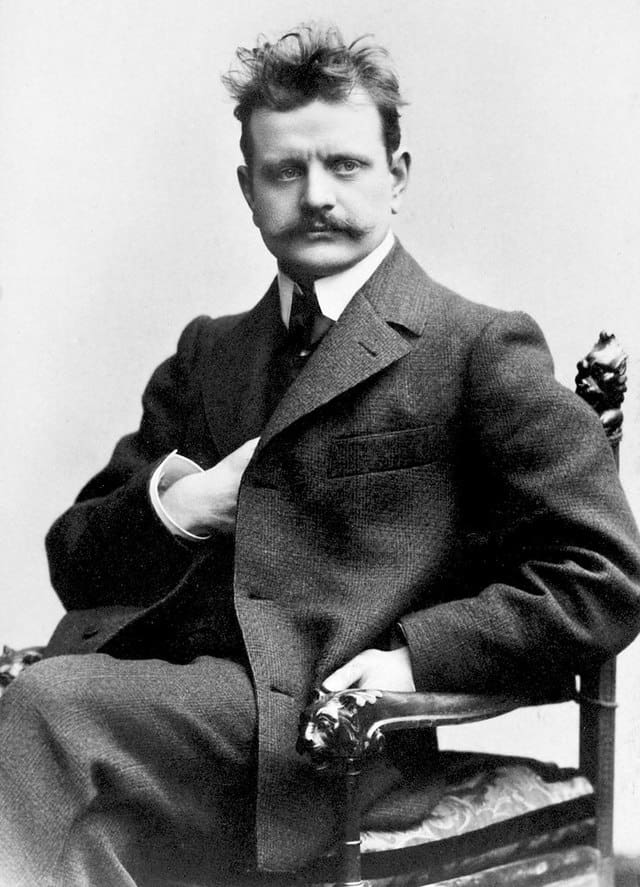
Photographerː Daniel Nyblin, CC BY 4.0, via Wikimedia Commons
Jean Sibelius, the Finnish composer, left an indelible mark on the cultural history of Finland through his nationalist symphonies and evocative compositions.
Renowned for masterpieces like the tone poem “Finlandia” and the Karelia Suite, Sibelius’s music became a powerful symbol of Finnish identity.
His orchestral works, characterized by sweeping melodies and a deep connection to nature, contributed significantly to the development of Finnish classical music.
Sibelius’s legacy endures as a cultural icon, embodying the spirit of Finnish nationalism and capturing the essence of the country’s landscapes and folklore, making him one of the central figures in the history of Nordic music.
22. Giacomo Puccini
Giacomo Puccini, the Italian opera virtuoso, achieved immortal fame through his masterful compositions, particularly the enduring classics “La Bohème” and “Madama Butterfly.”
A luminary of verismo opera, Puccini pioneered a style emphasizing realistic portrayals of everyday life, captivating audiences with emotionally charged narratives.
His ability to infuse operatic drama with genuine human experiences and poignant melodies set him apart as a major figure in late 19th and early 20th-century music.
Puccini’s profound influence on the operatic genre, marked by his exquisite craftsmanship and emotive storytelling, solidifies his legacy as one of the foremost contributors to the rich tapestry of Italian classical music.
23. Béla Bartók
Courtesy of YouTube
Béla Bartók, the Hungarian composer and ethnomusicologist, stands as a trailblazer in 20th-century music.
Renowned for his pioneering work in ethnomusicology, Bartók extensively collected and incorporated Eastern European folk music into his compositions, bridging the gap between the traditional and the avant-garde.
His legacy is epitomized in works such as the transformative string quartets and the pedagogical Mikrokosmos piano pieces, showcasing his profound understanding of both classical and folk idioms.
Bartók’s exploration of musical roots, innovative harmonies, and rhythmic complexities solidify him as a luminary, leaving an enduring impact on the trajectory of modern classical music.
24. Maurice Ravel
Maurice Ravel, the French composer synonymous with Impressionism, stands as a luminary in classical music.
Renowned for his evocative compositions, including the hypnotic “Boléro” and the ballet “Daphnis et Chloé,” Ravel’s music transcended conventional forms.
His mastery of orchestration, exemplified in works like “La Valse,” showcased a keen sense of color and texture.
Ravel’s artistry, while associated with the Impressionist movement, defied categorization, revealing a unique fusion of harmonic innovation and meticulous craftsmanship.
His contributions to 20th-century music endure, solidifying Ravel as a trailblazer whose influence continues to resonate in the realms of orchestral composition and beyond.
25. John Williams
Courtesy of YouTube
John Williams, the iconic American composer born in 1932, has left an indelible mark on the world of film scoring.
Renowned for his unforgettable compositions, he brought to life cinematic classics like “Star Wars,” “Indiana Jones,” and “Jurassic Park.”
Williams’s ability to craft epic and emotionally resonant scores has earned him multiple Academy Awards for Best Original Score.
His impact extends far beyond the screen, as his music has become synonymous with storytelling in the modern era.
Williams’s extraordinary career showcases his unparalleled talent in creating enduring and iconic musical landscapes that continue to captivate audiences worldwide.
26. Philip Glass
Philip Glass is an American composer born in 1937. His synonymous with minimalism has profoundly shaped contemporary music with his innovative compositions.
Renowned for his repetitive structures, exemplified in groundbreaking works like “Einstein on the Beach,” Glass’s style has left an indelible mark on the musical landscape.
Beyond his influence on classical and avant-garde music, he has successfully ventured into film scores, receiving acclaim for soundtracks like “The Hours” and “Koyaanisqatsi.”
Glass’s ability to blend rhythmic precision with emotional depth has garnered him widespread recognition and made him a seminal figure in the evolution of modern classical and film music.
27. Arvo Pärt
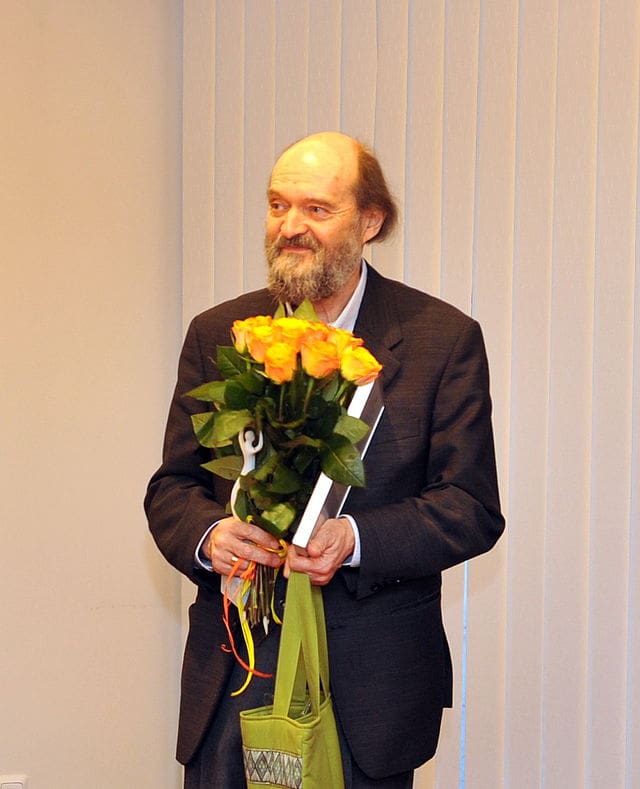
Estonian Foreign Ministry, CC BY 2.0, via Wikimedia Commons
Arvo Pärt is an Estonian composer who was born in 1935 and became a luminary in contemporary classical music, renowned for his minimalist and spiritually inspired compositions.
Pärt’s distinctive tintinnabuli style, exemplified in works like “Spiegel im Spiegel,” reflects a deep connection to spirituality and meditative contemplation.
His music, often characterized by a serene and introspective quality, has resonated globally, making him one of the most performed living composers.
Pärt’s ability to distill profound emotions into minimalist expressions has earned him acclaim and enriched the modern classical repertoire, solidifying his status as a transformative figure in the evolving landscape of 20th and 21st-century music.
28. Ennio Morricone
Ennio Morricone was the iconic Italian composer, who left an indelible mark on cinematic history with his evocative film scores.
Renowned for his work on legendary films such as “The Good, the Bad, and the Ugly,” Morricone’s compositions elevated storytelling through music.
Prolific and versatile, he created over 500 scores for cinema and television, showcasing an unparalleled ability to capture the essence of diverse narratives.
Morricone’s impact was recognized with an Honorary Academy Award in 2007, acknowledging his profound influence on the art of film scoring and cementing his legacy as one of the greatest composers in the history of cinema.
29. Hans Zimmer
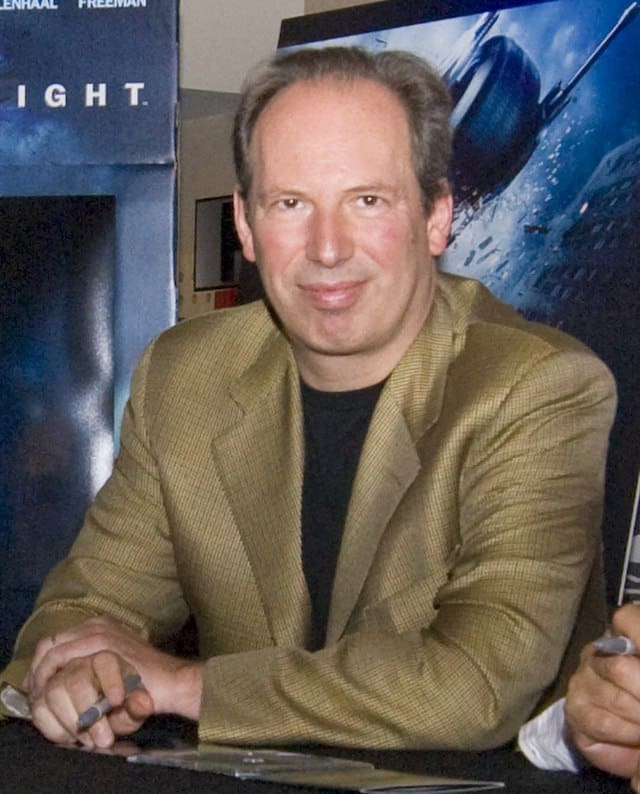
JNH et HZ.jpg: Yann de la marnederivative work: Ianmacm, CC BY 2.0, via Wikimedia Commons
Hans Zimmer, the prolific German film score composer and record producer, has left an indelible mark on the cinematic landscape born in 1957.
Renowned for his evocative and innovative scores, Zimmer has crafted musical narratives for iconic films like “The Lion King,” “Inception,” and “The Dark Knight.”
His ability to seamlessly integrate music with storytelling has earned him numerous accolades, including multiple Academy Awards and Grammy Awards.
Zimmer’s sonic landscapes, characterized by rich orchestrations and memorable motifs, transcend traditional film scoring, contributing significantly to the emotional resonance of some of cinema’s most celebrated works and solidifying his status as a luminary in the world of film composition.
30. Cécile Chaminade
Cécile Chaminade, the French composer and pianist, defied the gender norms of her era, emerging as one of the few female composers to attain international acclaim.
Renowned for her enchanting piano compositions and salon music, Chaminade’s works exuded charm and elegance, capturing the spirit of the Belle Époque.
Her career flourished despite the challenges faced by female composers, with compositions like “Autumn” and “Scarborough Fair” resonating across continents.
Chaminade’s legacy endures as a trailblazer, proving that artistic brilliance knows no gender boundaries, and her contributions remain a testament to the enduring impact of women in the history of classical music.
Planning a trip to Paris ? Get ready !
These are Amazon’s best-selling travel products that you may need for coming to Paris.
Bookstore
- The best travel book : Rick Steves – Paris 2023 – Learn more here
- Fodor’s Paris 2024 – Learn more here
Travel Gear
- Venture Pal Lightweight Backpack – Learn more here
- Samsonite Winfield 2 28″ Luggage – Learn more here
- Swig Savvy’s Stainless Steel Insulated Water Bottle – Learn more here
Check Amazon’s best-seller list for the most popular travel accessories. We sometimes read this list just to find out what new travel products people are buying.

